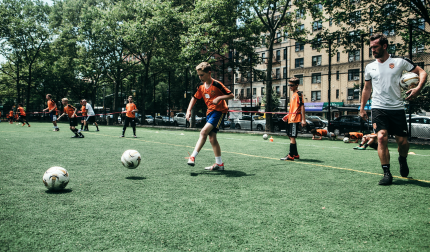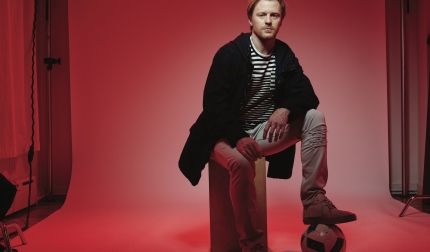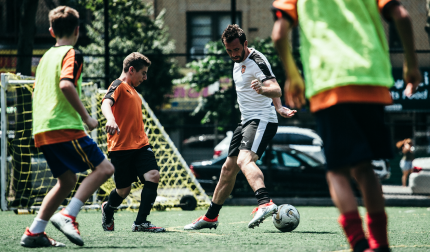When did you discover soccer?
I was four, and my older sister played. If you’re a girl growing up in California, you play soccer. I think that’s why we have a lot of players that make it very far on the women’s side. It was definitely a family affair. Neither of my parents played soccer. My mom played sports recreationally throughout her life. My dad played college lacrosse and football. But it really became a family thing. My parents were coaches. We trained all the time in the backyard together.
Was it always just soccer?
Growing up, I played tennis, softball and ran track just as much as I played soccer. It wasn’t really until I got to high school that I shut down all the other sports.
Why did you decide to go that route?
I never really looked that far into the future. I ended up playing tennis for reasons totally separate than soccer, and I still love tennis. Track, I didn’t enjoy as much. Tennis became a bit of a lonely sport. Everything just fell into place with it. With retrospection, the whole time I was playing soccer, I felt like it was something special, and it gave me confidence.
Once you decided on soccer, what was your dream?
It wasn’t until high school that I became super aware of the national team. I was still very present in my goal setting. I wanted to win a championship. I wanted to be the best player on the field. I tried to be super healthy and cultivate that. Once players on my teams started getting called up for national team tryouts and players were getting recruited for college, it became a lot more than being the best I could be. Obviously the national team is the biggest avenue for soccer players on the women’s side. They didn’t even have a league while I was growing up, so I looked to that and the World Cup. I actually went to the 1999 World Cup. I had my face painted red, white and blue, and I was dressed head to toe in American gear. It’s funny when I look back on that, because I don’t remember being there. I don’t remember looking at those women and saying, “I could do this.” But I can see it on my face in the photographs. I guess I was dreaming that big.
Was there a player you looked up to?
As a kid, I don’t remember it at all. Julie Foudy was my predecessor at Stanford. I always look up to her as a player and person, and I have so much respect for her. But that’s more as an adult. I didn’t think about any of it when I was younger.
After graduating from Stanford, you played in the Women’s Professional Soccer league for a year, and then it folded. As a pro soccer player, what was going through your mind?
That was the most pivotal moment in my career. I hadn’t been called for the national team. At that point, I wasn’t even aware that you could make money on the national team. I was signed to play a second year in WPS, and then the league folds. It blindsides you. When you’re 23, coming out of college, you’re not ready for the real world. You’re figuring out your finances and paying taxes. And now, all of a sudden, I’m unemployed. It was a crazy thing. It was either go abroad or quit playing. And at that moment, I was not happy with soccer. I felt very much like a failure. I was struggling internally. But not for a second did I consider quitting. I had five days to sign somewhere in the transfer window. I opened up my journal and made a list of anyone I thought could help me. I wrote down their email and phone numbers—all those coaches and connections that I had. I ended up moving to Sweden four days later.
Did you have an agent, or did you make the calls yourself?
I had an agent who was primarily an NFL agent. He didn’t have any female clients, and he definitely didn’t have any soccer clients. He encouraged me—let’s get connections and call. He wasn’t the typical soccer agent that knows all the teams and knows how to get you a contract. He could do all the negotiating of the terms, but he didn’t have a huge Rolodex of soccer contacts.

So now you head to Sweden. I’m sure there’s a language barrier. How did you deal with all of this change?
It’s hard for me to sum up my three years in Sweden tidily, because it was a very meaningful time in my life. First and foremost, I was very open to change. I wasn’t happy with my career. I went there with a very open heart, which is unlike me, because at that point I didn’t like change. I didn’t like being away from my family in Los Angeles. It happened at the exact right moment, when I went with an open heart and open mind to this small town called Göteborg, Sweden. I played on a team where I had never heard of any of the players, never heard of the coach. The coach didn’t speak English. And it was the most amazing experience. I had no pressure from my family, from my friends, from my own expectations. I was just who I was. No one was invested in what I was doing. I learned a completely new perspective and style of life that the Swedish people have, which is appreciation for daily moments and being happy. It’s very different from the American appreciation for being successful and working really hard. I got to slow down the pace of my life a little bit, settle in and redefine myself. In that first nine month period, I made friends that I still talk to to this day. I switched teams after a year and went to a new team with a ton of marquee players. Marta was on our team. Tony Gustavsson, the US national team assistant coach, was the head coach of the team. It was a totally different experience. It was as enlightening and invigorating as the first, but very different. I think I came back a changed player, and I think I also came back a changed person.
So when you went to Sweden, did you have any idea that you would be getting called up by the US national team?
Not at all. I moved in February, 2012. My first camp was in April, 2012. When I left for Sweden, I thought I was 100% saying goodbye to my prospects of playing for the US team. At that point, I don’t think I even really understood how women’s soccer worked (laughs). I just thought if I wasn’t playing in the US, there was no way they would even notice what I was doing. So I left and let go of that dream, dropped all of my expectations, and that’s what freed me so much. And it was the biggest moment of irony in my life when I got called in. Pia Sundhage, the US head coach at the time, was in Sweden, and she had seen me play. And after having seen me play in college, and seeing me play a year in the league, she didn’t want me. And then something had changed, and now she wanted me in camp. I always say I took the scenic route to the national team. It took 6,000 miles to distance myself from my home and then have the opportunity to come back.
We always think of musicians and artists as reinventing themselves, but not athletes. Yet it seems like you found a way for people to see you in a different way as an athlete.
In my reinvention, I was able to become a better version of myself, because the mental piece is so important. So when I let go of all those expectations and those pressures, I was just better. I was more effective; I was having more fun, and I was playing a better brand of soccer. It was a total reinvention, and it changed my perspective on myself and other people’s perspective of me.
In some ways, do you have to reinvent yourself regularly on the US national team. The country sees the team more closely every World Cup. So you enter the team as a rookie. Then the next time, you are in your prime. The time after that, you are the veteran. Every four years, a different role…
From the outside perspective, you see us in a flash every four years. I live it more as a daily challenge. I think that the moment I went to Sweden, everything changed for me. Now, playing on the national team, I feel more of a constant push in everything from my role changing to getting more leadership to changing positions. I constantly get pushed in a new way and have to face new challenges and new opportunities. That’s why maybe in four years, to the person that hasn’t seen us play in between World Cups, it may seem more like a reinvention.

You’re in your third season with the Chicago Red Stars of the NWSL. Do you feel the league has evolved during that time?
The league has changed a lot. The most important change is the players’ pride and investment in what they are doing. As an athlete, it’s hard to completely give yourself to a club or a league if you don’t know whether it’s going to stick around. You can’t trust them with your finances, and I think that puts players in a weird position. It puts a damper on a team’s culture. I’ve grown in my own club, and I’ve seen my teammates grow in their club. I see people light up when they talk about their club now. Three years ago, quite frankly, my teammates on the national team didn’t feel that way. I see my club teammates in Chicago with a sense of pride that they are doing well. They have a total focus. They work hard in the offseason, so they don’t get out of touch with the game. I think everyone is more invested, and it comes from the top. Owners are more invested, and that makes the NWSL as a whole more secure. It runs more smoothly, and it improves the quality of the football.
What is it like for you personally to be that woman that an entire generation of young girls looks up to?
There was a huge change in all of our lives after the World Cup. Right before the World Cup, I have a memory of a young girl on the street who knew who I was. And that was so cool because that never happens! And then after the World Cup, every single day, I will see someone who is a soccer fan who will ask me about the games. It’s a very big difference in lifestyle, and its good for the sport to have so much more viewership. It’s how we will continue to grow.
Obviously no one likes to lose. I’m sure this Olympics was a disappointment for all of you. As a team, how does a loss like this affect you, and how do you learn and grow from it?
During my time on the US team, I’ve been amazed by our ability to persevere against the odds. I was barely a part of the last cycle that included the 2012 Olympics. I’ve seen us win games that I just couldn’t fathom we could win. We would come back, get outplayed, score a goal—our team has an uncanny ability to persevere. So it was a serious shock for us not to win, especially when it was in our control. We could have done a thousand things differently. And I’m very interested to see what happens next. This is my first time being with the team in a major tournament where we’ve lost. We won the last Olympics. We won the World Cup. So to be honest, I don’t know how it goes from here. But it’s such an opportunity for us. There are so many new players on our team that are so youthful. Now, we have an opportunity to build and grow in the game, not just in the results but in style. It’s a chance to push the game forward. I am so confident in that group to maintain our identity as winners and our unwavering perseverance. I don’t know what exactly that will look like, but I can’t wait to be part of it.
Every time you’ve suffered a setback in your career—college, the WPS—you’ve come back stronger from it. And I’m not sure people understand how difficult tournament play is. You can be the best team, but it’s survive and advance. So many things can go wrong. You don’t have a full season to prove you’re the best.
There’s no room for mistakes in a tournament. You hate losing. You can’t get it back, and you just want to be mad about it. I just want to be angry about it. And then the rational part of me says that the moment that you are most uncomfortable is the moment that you have the most opportunity to grow. We lost and had to swallow our pride after being so celebrated last year. We have to come back, get our hands dirty, redefine our year and our goals and get after it. It was the worst thing that could have happened, but rebounding from it will be a very cool thing.





